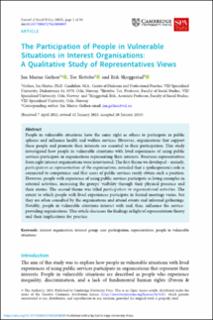| dc.contributor.author | Gathen, Jan Marius | |
| dc.contributor.author | Slettebø, Tor | |
| dc.contributor.author | Skjeggestad, Erik | |
| dc.date.accessioned | 2023-11-01T09:40:24Z | |
| dc.date.available | 2023-11-01T09:40:24Z | |
| dc.date.created | 2023-03-13T14:41:13Z | |
| dc.date.issued | 2023 | |
| dc.identifier.citation | Journal of Social Policy. 2023, 47 (1), 1-18. | en_US |
| dc.identifier.issn | 0047-2794 | |
| dc.identifier.uri | https://hdl.handle.net/11250/3099924 | |
| dc.description | This is an Open Access article, distributed under the terms of the Creative Commons Attribution licence (https://creativecommons.org/licenses/by/4.0/), which permits unrestricted re-use, distribution, and reproduction in any medium, provided the original work is properly cited. | en_US |
| dc.description.abstract | People in vulnerable situations have the same right as others to participate in public spheres and influence health and welfare services. However, organisations that support these people and promote their interests are essential to their participation. This study investigated how people in vulnerable situations with lived experiences of using public services participate in organisations representing their interests. Fourteen representatives from eight interest organisations were interviewed. The first theme we developed – namely, participation as representatives of the organisations, revealed that a spokesperson’s role is connected to competence and that users of public services rarely obtain such a position. However, people with experience of using public services participate as living examples in external activities, increasing the groups’ visibility through their physical presence and their stories. The second theme was titled participation in organisational activities. The extent to which people with lived experiences participate in formal meetings varies, but they are often consulted by the organisations and attend events and informal gatherings. Notably, people in vulnerable situations interact with and, thus, influence the service providing organisations. This article discusses the findings in light of representation theory and their implications for practice. | en_US |
| dc.language.iso | eng | en_US |
| dc.publisher | Cambridge University Press | en_US |
| dc.rights | Navngivelse 4.0 Internasjonal | * |
| dc.rights.uri | http://creativecommons.org/licenses/by/4.0/deed.no | * |
| dc.subject | Medvirkning og deltakelse | en_US |
| dc.subject | Participation | en_US |
| dc.subject | Interesseorganisasjoner | en_US |
| dc.subject | Civil Society Organizations | en_US |
| dc.subject | Empowerment | en_US |
| dc.subject | Empowerment | en_US |
| dc.subject | Deltagende demokrati | en_US |
| dc.subject | Participatory Democracy | en_US |
| dc.subject | Brukermedvirkning | en_US |
| dc.subject | User participation | en_US |
| dc.subject | Demokrati og medborgerskap | en_US |
| dc.subject | Democracy and citizenship | en_US |
| dc.subject | people in vulnerable situations | en_US |
| dc.subject | representation | en_US |
| dc.subject | user participation | en_US |
| dc.subject | interest group | en_US |
| dc.subject | interest organisations | en_US |
| dc.title | The participation of people in vulnerable situations in interest organisations: A qualitative study of representatives views | en_US |
| dc.type | Peer reviewed | en_US |
| dc.type | Journal article | en_US |
| dc.description.version | publishedVersion | en_US |
| dc.rights.holder | © The Author(s), 2023. Published by Cambridge University Press. | en_US |
| dc.subject.nsi | VDP::Samfunnsvitenskap: 200 | en_US |
| dc.subject.nsi | VDP::Social sciences: 200 | en_US |
| dc.subject.nsi | VDP::Samfunnsvitenskap: 200 | en_US |
| dc.subject.nsi | VDP::Social sciences: 200 | en_US |
| dc.source.pagenumber | 1-18 | en_US |
| dc.source.volume | 47 | en_US |
| dc.source.journal | Journal of Social Policy | en_US |
| dc.source.issue | 1 | en_US |
| dc.identifier.doi | 10.1017/S0047279423000089 | |
| dc.identifier.cristin | 2133537 | |
| cristin.ispublished | true | |
| cristin.fulltext | original | |
| cristin.qualitycode | 2 | |

